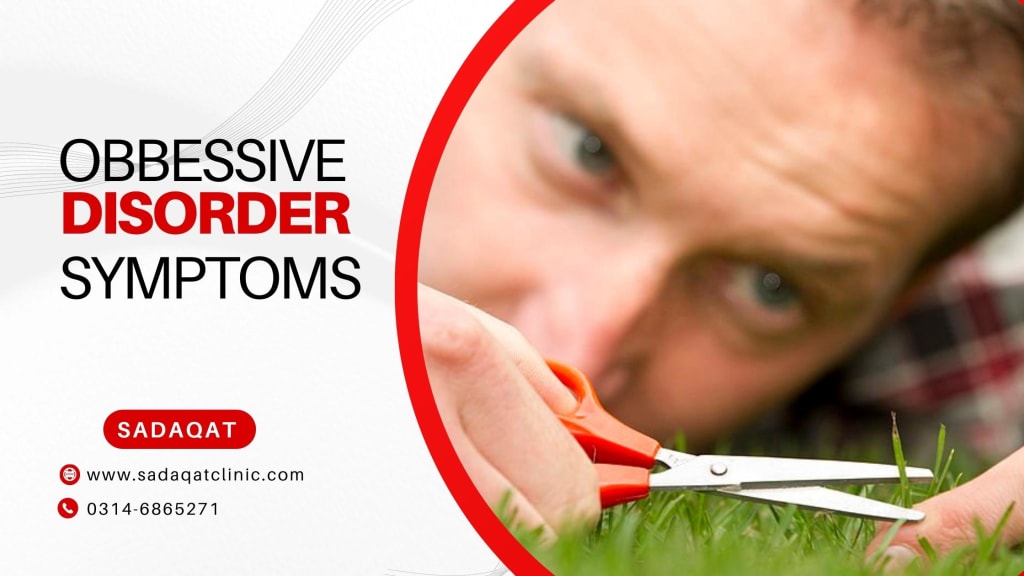Symptoms of Obsessive Disorder | Sadaqat Clinic Karachi
Symptoms of obsessive disorder

Although most people's OCD symptoms will respond to treatment with medication such as selective serotonin reuptake inhibitors (SSRIs), up to a third of people with OCD, do not seem to benefit from drug treatment. Sadaqat Clinic Karachi the best addiction treatment center in Karachi treats many addiction-related patients as many other people get cured of them. A recent study in the Journal of Anxiety Disorders evaluated the effectiveness of cognitive behaviour therapy (CBT) in people who were non-responsive to multiple treatment trials with SSRIs.
Patients received 20 to 25 sessions of CBT over three months. Most patients were able to complete treatment, and the majority maintained gains made during CBT a year after the study was complete. Interestingly, those who completed their homework regularly and whose symptoms were less severe at the start of therapy appeared to do best.
Many patients would like to involve their families in treatment but are unsure when this is appropriate or even how to go about doing this. Have you asked family members to participate in your OCD treatment? If so, did you find it helpful? Share your experience. Some recent studies suggest that adding exercise to your treatment package could be helpful for reducing OCD symptoms. Do you currently exercise? Have you found exercise helpful in reducing your OCD symptoms? If so, what kind of exercise have you found the most helpful?
If you have OCD, work seeking out, obtaining, and maintaining gainful employment can be highly challenging. While symptoms of OCD can get in the way of completing the required duties of a particular job, there is also the significant challenge of stigma, prejudice, and discrimination associated with mental illness. Have you ever been discriminated against at work because of your OCD? If so, how did you cope with it?
The concept of OCD types may seem like a foreign one to some. Many people believe that OCD causes the exact same set of symptoms and is experienced in the same way by every person it affects. Though OCD is broadly defined as the presence of obsessions and compulsions that cause significant distress or disruption to daily living, there are nuances in the symptoms of OCD. OCD can affect individuals differently depending on when it occurs, for example, and it can appear in vulnerable individuals in response to very specific circumstances (such as infection or the birth of a child).
Clinicians and mental health researchers have suggested that OCD can be further divided into different subtypes based on the nature of the symptoms experienced, such as obsessions and compulsions related to cleanliness versus obsessions and compulsions related to symmetry. Symptoms of the stress at the best addiction treatment center in Karachi you can read it.
Although the experience of a particular symptom subtype appears to be relatively stable, it is possible to experience a change in the nature and focus of your symptoms over time. Most symptom subtypes generally respond to some combination of cognitive-behavior therapy, exposure and response prevention, and medication.
Pathological or Compulsive Hoarding
This subtype of OCD has received considerable attention. In general, hoarding is characterized by acquiring and failing to throw out many items that would appear to have little or no value to others (such as newspapers), in turn causing severe cluttering of the person's home so that it is no longer able to function as a viable living space and significant distress or impairment of work or social life.
Hoarding can be the affected person's only symptom, or it can be one of just many OCD symptoms they experience. In addition, some cases of childhood-onset OCD, such as PANDAS, may have causes that are unique to children. Although we usually think of OCD as being caused by a combination of stress, genetic factors, and an imbalance of chemicals in the brain.
About the Creator
Willing Ways
Willing Ways is the Best addiction treatment center in Pakistan. We are the pioneer in drugs & alcohol treatment centers with outstanding services and a history of 43 years. We deliver quality writing that is beneficial for you.






Comments (1)
great thoughts !!!!